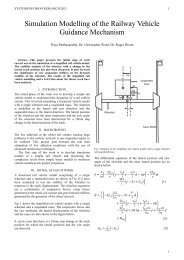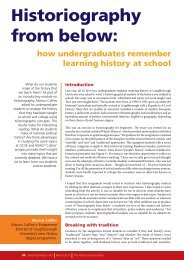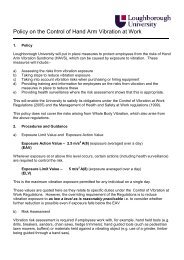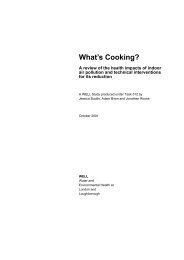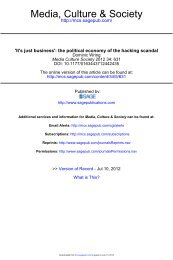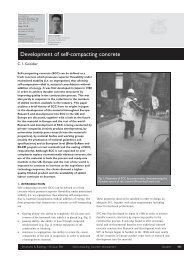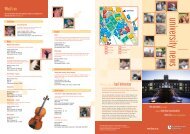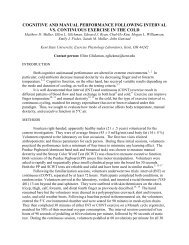Download this issue - Loughborough University
Download this issue - Loughborough University
Download this issue - Loughborough University
You also want an ePaper? Increase the reach of your titles
YUMPU automatically turns print PDFs into web optimized ePapers that Google loves.
charities have long acknowledged that more<br />
XXXX women than men use their services. Women also<br />
tend to seek that advice early, before a cash crisis spirals out of<br />
control. So what’s preventing men getting the debt advice they<br />
need? How can debt charities break down these ‘barriers’ and<br />
encourage more men to come forward and deal with their debts?<br />
A leading financial charity commissioned Dr Jackie Goode and her<br />
team at <strong>Loughborough</strong>’s Centre for Research in Social Policy, to<br />
explore the sociological and psychological factors affecting men<br />
and debt. Dr Goode spoke with Alison Laing about the findings.<br />
The UK’s economic woes are well<br />
documented. Financial experts say we are in<br />
recession with little sign of recovery anytime<br />
soon. As a consequence, household debt<br />
is on the rise. While debt charities report a<br />
slight increase in the number of enquiries<br />
from men, <strong>this</strong> trend is against an underlying<br />
background of gender imbalance. Typically,<br />
it is still the case that women are the most<br />
likely to seek help with their debts, while<br />
men need more of a ‘push’.<br />
Dr Goode conducted research into these<br />
behaviours on behalf of the Money Advice<br />
Trust. It was a project she and her team took<br />
on with relish.<br />
Dr Goode said: “There is a whole body of<br />
scholarship out there on what happens<br />
to money in households. That research<br />
has mainly focused on women, for very<br />
good reason. In low income households in<br />
particular, it tends to be women who manage<br />
the household budget on a day-to-day basis.<br />
Female partners are also more willing to<br />
come forward and discuss their money<br />
problems than men.<br />
“But what made <strong>this</strong> research project<br />
so exciting, and quite unique, was that it<br />
provided a rare opportunity to hear men’s<br />
24 the research & enterprise view<br />
voices on the subject of debt. What did they<br />
see as their role in managing household<br />
finances? And just how did their overindebtedness<br />
occur?”<br />
The £20,000, small-scale, exploratory study<br />
took three months to complete. The male<br />
volunteers were recruited on the doorstep<br />
by a specialist agency. Some were in couple<br />
households, some were lone male parents,<br />
and one lived in a house share. Just over half<br />
were in households in receipt of an income<br />
of under £15,000 per annum, a quarter were<br />
in receipt of less than £25,000 a year, two<br />
were in receipt of between<br />
£30,000 - £40,000, and<br />
one was in receipt of<br />
£42,000. The interviews<br />
lasted on average 90<br />
minutes, and each<br />
was personally<br />
conducted in<br />
the<br />
Dr Jackie Goode<br />
individual’s home by either Dr Goode or her<br />
colleague, Dr Amanda Waring.<br />
Dr Goode said: “Getting a good sample of<br />
men willing to sign-up for the study proved<br />
difficult. The specialist agency we employed<br />
to recruit volunteers experienced much<br />
resistance. A phrase that kept coming up<br />
was ‘male pride’. We found <strong>this</strong> feedback<br />
from the agency very useful, as it alerted us<br />
to an <strong>issue</strong> we would later follow up in the<br />
interviews.”<br />
Dr Goode continued: “To get an overall<br />
picture of over-indebtedness in each<br />
individual household we began with some<br />
factual questions, such as what kinds of<br />
debts they had, at what level, whether they<br />
had ever sought professional advice, and if<br />
not, why not?<br />
“Then we introduced a set of topics which<br />
were more conversational and exploratory.<br />
We wanted to understand how men managed<br />
on a day-to-day basis and what strategies<br />
they employed to cope with debt. It’s simply<br />
not the case that you have manageable<br />
debts one day, and the next you are overindebted.<br />
It’s an unfolding process, and they<br />
began telling us their stories.”<br />
“Men seem to take a ‘do-ityourself’<br />
approach to overindebtedness.<br />
They feel it’s<br />
their responsibility to get<br />
themselves out of trouble”<br />
In looking at the routes into over-indebtedness,<br />
Dr Goode and her team found that<br />
arrears on bills and rent were most typical,<br />
but relationship breakdowns also figured,<br />
(either where a man had to manage debts<br />
himself for the first time, or where he became<br />
liable for a financial settlement). Drug and<br />
gambling addiction were also mentioned.<br />
Dr Goode explained one of the research<br />
outcomes, and perhaps key to why men leave<br />
it so late to seek advice, centered on male<br />
identity <strong>issue</strong>s. She said: “Men seem to take<br />
a ‘do-it-yourself’ approach to over-indebtedness.<br />
They feel it’s their responsibility to<br />
get themselves out of trouble. Women may<br />
feel empowered by being able to manage<br />
a tight budget, but men often believe they<br />
should be the providers for their families and<br />
are embarrassed to share their problems<br />
with friends, family or professional services,<br />
meaning debt frequently worsens over time.”<br />
Dr Goode added: “It’s important to recognise<br />
that the provider, or breadwinner, identity is<br />
still out there. Men are often judged on<br />
the money that they earn, or don’t earn.<br />
Traditionally, unemployment<br />
has been an attack on<br />
men’s identity. If a man is a<br />
high earner, that enhances his identity.<br />
This male pride and do-it-yourself attitude<br />
– in relation to problematic debt – is a new<br />
finding. I don’t think it’s been properly<br />
explored in <strong>this</strong> context before.<br />
“There are clearly many complex<br />
psychological and sociological factors at<br />
play here. If debt advisors could frame their<br />
marketing messages to men as “providers”<br />
or as “caring for their family” in seeking<br />
advice they may find <strong>this</strong> appeals, and could<br />
encourage more men to come forward.”<br />
New technologies also played their part in<br />
how men managed household income.<br />
Dr Goode said: “We noted some men took<br />
pride in using technology to keep track<br />
of their money. They’d shop around, move<br />
their cash about to secure better<br />
rates of interest,<br />
get text alerts when<br />
nearing their overdraft<br />
limit. Online banking and<br />
telephone banking gave them<br />
a sense of control over their<br />
finances. Some tried to make ‘clever’<br />
investments and saw <strong>this</strong> as ‘beating the<br />
system’, but the danger here was that <strong>this</strong><br />
could also lead to over-indebtedness.<br />
“Because men appeared to be both<br />
confident and competent at using these<br />
new technologies, we suggested to debt<br />
charities that some of the products they have<br />
developed, such as online self-help tools, may<br />
have particular appeal to male consumers.”<br />
Another barrier to men seeking advice<br />
was the mistrust that arose from being<br />
unable to distinguish between the free and<br />
independent advice offered by financial<br />
charities, and that of the commercial debtmanagement<br />
companies. The <strong>Loughborough</strong><br />
team suggested charitable groups emphasise<br />
their free and independent status.<br />
Dr Goode said: “From the sample of men we<br />
studied, those who had sought advice from<br />
debt charities told us they found it extremely<br />
useful, which was encouraging.”<br />
Visit: www.lboro.ac.uk/departments/ss/staff/goode<br />
Contact: dr Jackie goode<br />
Email: J.e.goode@lboro.ac.uk<br />
Publication: Goode, J. and Waring, A. (2011) Seeking direction: Men,<br />
money advice and the road to financial health. CRSP/Money Advice Trust<br />
the research & enterprise view<br />
25




